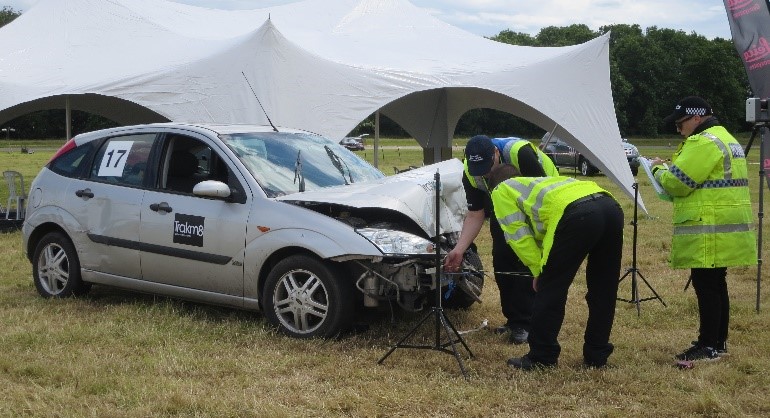The Institute of Traffic Accident Investigators crash test days provide a range of well-structured activities for industry professionals with a personal or commercial interest in collision investigation. From staged collisions to specialised driving activities, the ITAI event allowed experts to advance their experience and knowledge in an industry that continues to evolve.
Witnessing high-speed collisions, participating in vehicle handling exercises and specialist vehicle driving opportunities gave experts first-hand experience in a safe and controlled manner – something that is ordinarily unachievable.
Among the wide array of crash testing performed at the event, the Police Forensic Collision Investigation teams held staged collisions to create a ‘ground truth’ database for crush analysis. In other testing, several low-speed head on collisions took place with on-board recording equipment to assist those involved in the low-velocity insurance and fraud industry. The results from these low-speed tests offer valuable data sets for experts involved in causation.
The real excitement for our Expert Witness team was the opportunity to participate in a range of expert driving activities. In a series of controlled tests, members of TRL were able to experience the effects of low tyre pressure and braking defects on vehicle performance and the consequences of critical speed manoeuvring. These tests offered experts a strong understanding about the strain placed on drivers, the vehicle and the road surface under an array of different circumstances.
Critical speed tests involved accelerating a motorcar to 60 mph before applying steering inputs sufficient to cause all wheels to side slip. This manoeuvre demonstrates that negotiating curves at or above their critical speed, often forms characteristic tyre marks on the road surface. Analysis and measurements of these tyre marks assists collision investigators to determine the speed of a vehicle at their onset. This activity allowed the TRL Expert Witness team to evaluate the dynamics of critical speed in a safe and controlled manner, thereby providing first-hand experience which they can present in evidence during any related court trials.
Braking defect trials involved emergency procedures in a specially adapted test car to simulate a significant brake defect, reducing its braking efficiency. Each reduced braking efficiency test was performed at speeds around 40 mph, resulting in a significantly longer distance required to bring the vehicle to a stop.
Although the science of braking defects is well understood, by comparing emergency braking between a defect-free motorcar and one with a significant reduction in braking efficiency, the TRL Expert Witness team can relate to how road users may describe this lack of braking performance, should a defect be part of their investigation.
The final tests the team experienced enabled them to understand the effect low tyre inflation pressure has on vehicle handling. Two identical cars were used, including an exemplar vehicle with correct tyre inflation pressures and a test vehicle with a severely under-inflated rear tyre. Both vehicles were driven at 40 mph through a course with a driver applying rapid steering inputs. The difference in handling between the exemplar and test vehicle under these harsh steering conditions was notably different, with the test vehicle losing directional control both at slower speeds and with lesser steering inputs than the exemplar. The experience gained through such participation in previous testing is often cited in TRL’s investigation reports.
Overall, ITAI’s crash test and research day continues to provide staged collision testing with modern and advanced data recording capabilities, all of which assist the automotive industry to better understand and work towards improving road safety.
Specialist knowledge and academic qualifications are only part of the makeup of the TRL Expert Witness team. Participation in activities held at this and other crash days, provides our experts with first-hand experience of vehicle dynamics under extreme conditions, ensuring our investigation reports will continue to provide clear, independent and reasoned opinion for clients in the UK and around the globe.







